PHILADELPHIA — Justin Verlander was dripping with water, beer, mustard, ketchup and happiness. Laundry will take care of the liquids and condiments. The joy never will be cleansed.
At the age of 39, in his ninth crack at it and at the end of one of the most improbable, impressive comeback seasons from Tommy John surgery, Verlander finally won a World Series game. And that is why after the Astros exhaled after a nervy 3–2 win over the Phillies in World Series Game 5, the first thing they did was stuff Verlander into a laundry cart, wheel him into the shower room at Citizens Bank Ballpark and salute him with what’s known in the baseball world as a Rookie Shower, the traditional dumping of liquids and foodstuffs on a rookie upon a first win.
“And it feels f---ing amazing,” Verlander said. “Never felt f---ing better!”
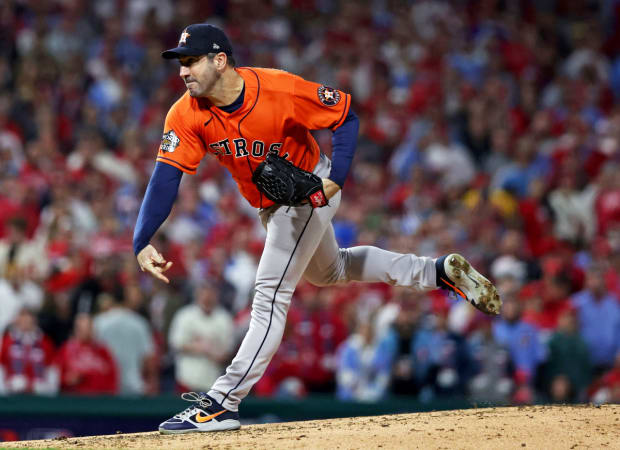
Bill Streicher/USA TODAY Sports
He meant the sloppy and chilled feeling from the shower, but it worked well, too, to describe the satisfaction of having finally won a World Series game. He appeared and sounded giddy, even childish, such was the purity of his joy. Verlander had been 0–6 with a 6.07 ERA in eight previous World Series starts.
Richard Burton never won an Oscar. Rory McElroy has never won the Masters. Verlander’s baseball career seemed similarly incomplete. He had done just about everything else in the game: Rookie of the Year, MVP, two-time Cy Young Award winner, pitching Triple Crown winner, three no-hitters, two 20-win seasons, five-time strikeout champion and a World Series champion.
“Everybody in this room,” third baseman Alex Bregman said in the winning clubhouse, “knows how meaningful that one win is. It’s meaningful to all of us, not just him. He’s our staff ace, our leader.”
“It means even more,” fellow pitcher Lance McCullers Jr. said, “because of when he got it done, where he got it done and how he got it done. He had to battle. That made it all the more sweeter.”
Verlander navigated a world of trouble throughout five treacherous innings.
“Navigated?” he said incredulously. He laughed. “Survived. I was just trying to survive out there.”
Verlander has won 260 games in his career, postseason included. This was the only one in which he lasted five innings, the minimum required for a win, while allowing eight baserunners and letting just one score. It was like watching a circus acrobat ride across a tightrope on a unicycle: scary and thrilling at the same time, or also a bit like undergoing Tommy John surgery with almost 3,000 innings on your arm.
“Think of a sprinter in the starting block and the block is loose.”
That was the analogy Dr. Keith Meister gave Verlander in September 2020 to get him to understand what happened to his right elbow. Meister told him his ulnar collateral ligament was shot and he would need Tommy John surgery.
“The sprinter can’t push off the same when that block is loose,” Meister told him. “That starting block is your ligament.”
Meister performed the surgery Sept. 30, 2020. The recovery would keep Verlander out of two postseason runs for Houston.
“In my mind, I immediately related that [analogy] to my season,” Verlander said. “I’ve always been somebody who when I wanted to step on the gas, my velocity would increase. I’d start the game at 92, 93 and if I needed it, it was 97, 98, 99, 100.
“All of a sudden in ‘18 and ’19, I started stepping on the gas and it wasn’t there. I was throwing 94-95 and I’d step on the gas and it was 95, 95, 96, 95, 96.”
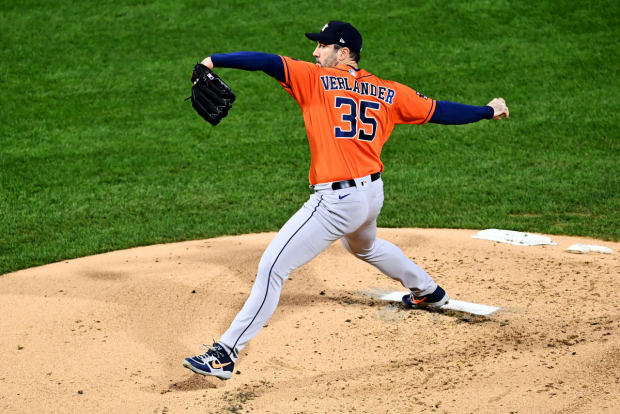
Kyle Ross/USA TODAY Sports
In Tommy John surgery, the surgeon opens a three- to four-inch incision near the inside of the elbow. Holes are drilled into the ulna and humerus bones. A tendon fetched from elsewhere in the body—typically, the Palmaris tendon in the forearm—is woven into the holes in a bit of surgical latticework. The surgery takes less than an hour. The recovery takes about 14 months. The patient cannot pick up a baseball for almost five months.
“I did six, seven hundred hours of body work,” Verlander said. “My arm was the easiest part of my rehab, to be honest with you. I was trying to unwind 15 years of stress on my body. That was really my goal.
“I feel like I was able to turn back the clock some. That work is hard work. It’s not like easy, soft tissue stuff. I can’t do it in season. It’s too aggressive and hard. It’s just something like everything else I did: I embraced it, went for it and thought it was the right decision. And I definitely think it was now.”
In the five decades since Dr. Frank Jobe performed the first such surgery on the pitcher who would be the eponymous patient, nearly 2,000 pitchers have had Tommy John surgery. Among that group, only about 10 were at least as old as Verlander, who was 37 at the time. Only three of those older patients were starting pitchers: Bronson Arroyo, 37, José Contreras, 40, and Jamie Moyer, 47. None of them made it back for more than one inconsequential season. Only Moyer had pitched more innings (4,020 ⅓) at the time of Tommy John surgery than Verlander (2,988).
Finding an older workhorse as inspiration for Verlander was difficult. Frank Viola had logged a similar number of innings (2,791), but he was 34. (He returned for only nine games over two years). Tommy John himself had thrown 2,165 ⅔ innings and would go on to pitch another 14 years, but he was only 31 at the time.
“Of course, there are doubts,” Verlander said. “But you try to fight those thoughts. In my mind, it’s an 89% return to previous form. My previous form was Cy Young caliber in 2019. To me, it was, O.K., I have an 89% chance to return to that form.
“Additionally, I’ve had two other major surgeries to my core before that and my body responded really well to that. My body was able to use it, go through the process. I didn’t have too much scar tissue. I didn’t get too tight. I didn’t have issues with it. In my mind I was like, O.K., let’s tack on another 5–6% to that. So, in my estimation I’m 95% going to return to the form that I was.
“So that kind of helped me really just stay in a positive mindset always, which I think is important. And then once I started throwing ...”
Verlander resumed throwing March 17, 2021 at spring training. The training staff was blown away by how easy he made it look.
“Really, the first day I picked up a ball everybody was shocked how natural it looked,” he said. “Seriously. My physical therapist and the guy I played catch with, who had seen a bunch of Tommy John patients, were like, ‘Looks like you didn’t have anything done, like your first catch of the offseason.’ That’s what it felt like.
“It was kind of like that the entire process. I couldn’t go at it too hard. I had to follow the regimen, but every step of the way it felt remarkably like me.”
Maybe, Verlander decided, all those innings on his odometer worked in his favor, not against it.
“I’ve heard people say it feels foreign or different and you have to re-find it,” he said. “I personally did not feel that. Maybe because I’m one of the only ones that had 3,000 innings under my belt before I had it. My body knows what to do.”
In April 2022 when he returned to the big leagues, Verlander averaged 94.7 mph on fastball, a hair better than his 2019 velocity (94.6). By July it was 95.4.
“Everything feels normal,” he said. “If anything, my fastball is coming out a little bit better than what it was before.
“After the surgery, this year I’ve been able to reach back a few times and get 99. I think that’s because the ligament is tight again. In a little bit of a way, it probably helped me, just to be able to perform like I am naturally gifted to. The offspeed stuff I think I’ve struggled a little bit. The slider I’ve been kind of working all year to keep it good.”
Verlander finished 18–4 with a 1.75 ERA. He led the league in wins and won his second ERA title. He posted the lowest rate of walks and hits per nine innings (0.829). Whereas in 2019 he had thrown 34 pitches 97 miles per hour or faster, in ’22 he hit that number more than twice as often, 73. He hit 99 five times—as many times as he did combined in the three seasons from ’17 to ’19.
“I think I understand my body better,” Verlander said about how the surgery changed him as a pitcher. “Much like my first surgery on my core, I learned to embrace the process and learned as much as I can through that. This was very similar. I learned how to better prepare myself to stay healthy longer and stay fresh through a season.”
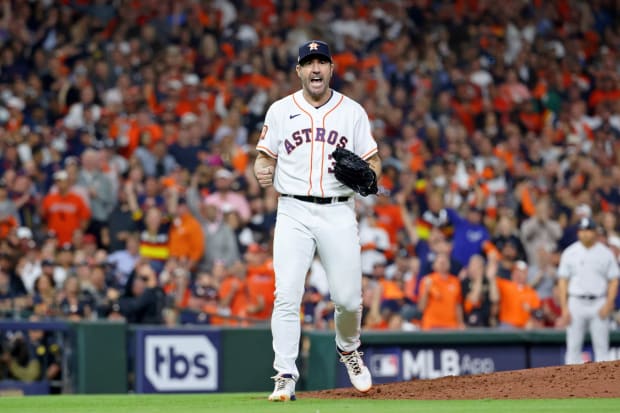
Troy Taormina/USA TODAY Sports
Verlander began the 2022 postseason with a spotty start against the Mariners, but rebounded by beating the Yankees in the ALCS with a six-inning, 11-strikeout gem. It pushed his postseason record in series before the World Series to 15–5.
But once back in the World Series, his Fall Classic woes returned. Verlander blew a 5–0 lead in Game 1. He gave up five runs in five innings to the Phillies. His slider, having lost its bite, simply rolled as an inviting target for hitters. For the first all season, Verlander did not get a swing and miss on his slider. His breaking pitches obtained one swing and miss, his lowest rate in 70 starts. Something was wrong.
“Probably the worst slider I had all year,” he said. “It is unusual. A lot of credit to them.”
He was on the field the next day playing catch with bullpen catcher Javier Bracamonte to figure why his slider was rolling instead of biting.
“Yes, it’s mechanical,” Verlander said between World Series starts. “Unfortunately, sometimes you need starts like that to point out you need to fix something, but unfortunately it happened in the World Series. It really sucks.
“It wasn’t game plan. It was just me pitching.”
The best Verlander could tell, he had developed bad habits playing catch and throwing bullpens, filling chasms of time between starts as the Astros swept through the first two rounds of the postseason.
“When things are going well, a lot of times it can make you not realize things aren’t quite right,” Verlander said. “The numbers look good. But one thing I’ve been good at, especially as I’ve gotten older, is understanding, O.K., their reaction isn’t quite right and you need to fix that. But when you’re only pitching once every 10 days or so because we swept, bad habits all of a sudden creep into your game. Because I’m throwing lazily for nine days now, and it creeps into a game and it’s too late. But it crept into the game, it is what it is, so now I’ve got to fix it.”
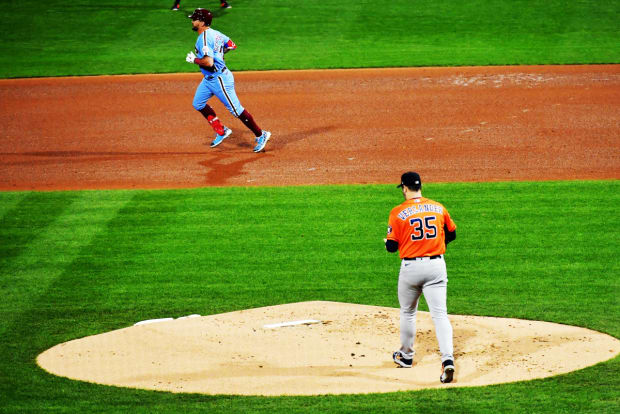
Eric Hartline/USA TODAY Sports
Verlander took the ball for Game 5 with the World Series tied. His teammates handed him a lead, just as they did in Game 1. He coughed up this one, too, losing the 1–0 edge with just his second pitch, a high fastball that Kyle Schwarber ripped for a home run.
The Phillies loaded the bases with two outs against Verlander in the second. He broke off two nasty sliders to Rhys Hoskins to get a swinging strikeout. That’s where his night turned.
“I thought I had fixed it coming in,” Verlander said of his slider. “But you never know until you use it in a game.”
The slider also bailed him out in the fifth, facing his final batter, Nick Castellanos, with a runner at second and two outs, trying to protect a 2–1 lead. Castellanos flied out softly, but only after a 10-pitch battle in which Verlander threw his only changeup of the night and shook off catcher Martín Maldonado for the first and last time to throw a curveball.
“I wanted something else,” Maldonado said, though he wouldn’t say which pitch he’d called.
Verlander gave a hearty fist pump upon getting Castellanos, knowing he was done.
Two days before his start, Verlander explained how he was fighting rust from a lack of competitive innings in October.
“I’m not trying to make excuses at all. It’s just facts,” he said. “This is what I think happened: I had a bad habit that crept in when I was playing catch. As you play catch, it’s not with intent on a mound, like a game—and you need that competition to sharpen the edge. Because you never work at that speed. I can’t work at that speed between starts—even with that many days off. Do you think before I pitch in the World Series I’m going to go throw a bullpen and go after it with game intent? No way. You can’t do that. There’s no way to replicate it.
“But then when you get in a game … there’s a reason it’s called midseason form, you know? It’s the only way to practice it. Thankfully, I’ve got a lot of practice doing it when something is off. I think one of my best abilities is fixing it. I sure as hell hope that I’ve done that.”
He did fix the pitch just in time, especially against a determined Philadelphia lineup that pressed him.
“It was about my balance,” he said about fixing his slider. “I stayed back and stayed behind it better. Thank God my offspeed stuff was working. Because they were ambushing my fastball, which meant I really needed my offspeed stuff. They totally changed their approach. It was a battle with those guys all night.”
In World Series Game 5 Verlander averaged 95.6 mph on his fastball, his fourth best velocity in a game all season. More importantly, the Phillies swung and missed seven times in 14 attempts to hit his slider. The bite in the pitch was back, just in time.
“He battled through,” Maldonado said. “His slider got better as the game went on.”
Said Verlander, “It feels f---ing great. Great. The best.”
Again, he could have been talking about his rookie shower or what was in his heart.
“It was one of the best feelings in my career,” he said, this time truly about the shower. “Just truly love these guys. I love our team. Like I said, this is a part of the reason why I say it’s so symbolic that so many people were a part of this win. And they rallied around me and they were almost just as happy that I got the win as I was. Just an incredible feeling. It feels great.”
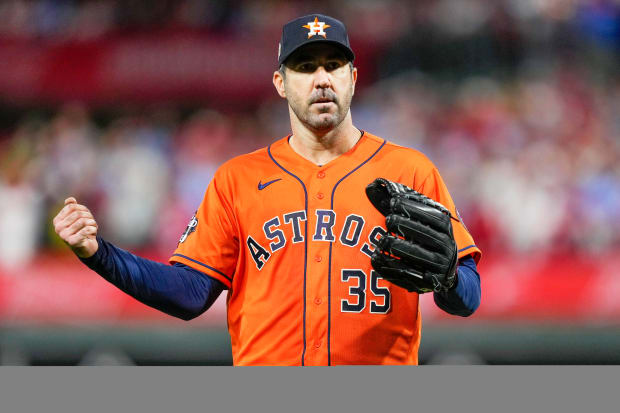
Matt Slocum/AP
Verlander peeled off his sopping wet, stained shirt and headed for the showers, this time for their intended purpose. Just after Verlander left, manager Dusty Baker walked into the clubhouse and asked a team staffer where he could find Verlander’s locker. Baker was holding something in his hand, a piece of paper. When he found Verlander’s locker, Baker stuffed the piece of paper into a secure place in it. It was his official lineup card from the game.
“I give them out when somebody does something special, as a keepsake,” Baker said.
He knew what this win meant for Verlander.
“Ws are important,” Baker said. “Don’t let anybody tell you that they’re not. And you know why they are? Because they are important to pitchers. They still are. And if they are important to pitchers, that’s a big deal.”
As Verlander can attest, Ws are hard to get. They have been hard to get from the very beginning, when “w” was not included in the classical Latin alphabet. Then, during the Middle Ages, the scribes of Charlemagne began using side-by-side “u’s” separated by a space to signify something that sounded like a “v.” By about 1700 the letter appeared in print as a unique letter, called “w.” It is the only polysyllabic letter. It is the symbol of Tungsten, which is as good a symbol as any for how Verlander checked the only box left on his pitching bucket list. It has the highest melting point among all metals.







